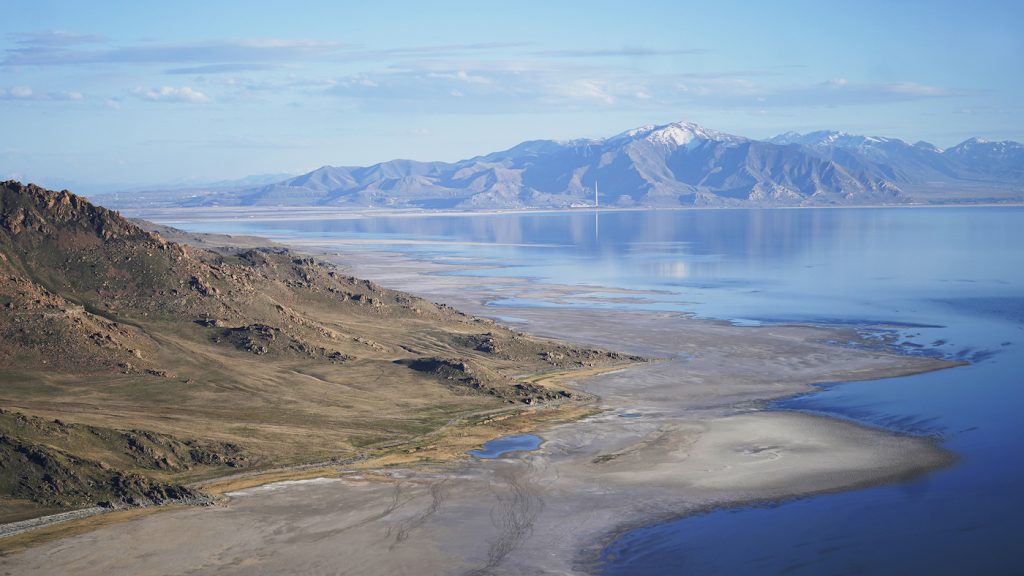Thirty-six law professors from around the country are requesting a Utah district court to hold the state accountable for the decreasing water levels in the Great Salt Lake.
The professors submitted an amicus brief on Friday in support of a lawsuit — initiated by conservation groups in the autumn — alleging that Utah has not ensured that sufficient water reaches the Great Salt Lake.
The writers also expressed their opposition to motions to dismiss the case, which were filed by private water users, water conservancy districts, municipalities and state agencies.
“The Great Salt Lake’s uncertain future can be addressed through legal means,” the professors stated.
Implementing conservation measures for the benefit of the Great Salt Lake is a complex effort, due to the demands of the water rights system that governs a large part of the U.S. West.
The system, which originates from the mid-19th century Homestead Act, allowed users to divert water based on a first-come, first-serve, priority basis — which means that imposing usage cutbacks for the lake could violate a higher-priority user’s water rights.
But the groups that sued the State of Utah in September argued that upstream diversions have led to a substantial reduction in the Great Salt Lake’s water — and that the state is obligated to protect this public resource.
“The Great Salt Lake belongs to the people of Utah,” Stu Gillespie, senior attorney with one of those conservation groups — Earthjustice — said in a statement. “It is time for the state to fulfill its obligation to protect this resource and address the unsustainable upstream water diversions that are putting it at risk.”
The process of reversing the basin’s decreasing water levels and ecological breakdown involves using what is known as the “public trust doctrine,” the law professors wrote in the amicus brief.
Such doctrines require governments to hold natural resources in trust for the public, with such resources typically including navigable waters and their submerged lands, per the brief.
In Utah, the public trust doctrine dates at least back to the state’s 1896 establishment and was enforced in its constitution — which recognized the doctrine’s applicability to lands and water and the concept of “beneficial use” as the basis for fulfilling those rights, the professors noted.
Beneficial use refers to a rights holder’s requirement to only use a diverted water allocation for predefined purposes, such as irrigation, hydropower, domestic, municipal, commercial or mining uses.
Regarding the public trust doctrine, the state legislature also has declared that all state waters belong to the people of Utah, the professors explained, noting that other Mountain West states have applied their own such doctrines to water bodies like the Great Salt Lake.
Demanding that the court correct “the state’s shortsighted view of its trust obligations,” the writers stressed the need to apply the public trust doctrine to water law — which they described as being “frozen in the 19th century.”
The state has the power to take water conservation actions to help the Lake, such as managing surplus water in wet years and requiring efficiency improvements.
The writers made it clear that existing rights don't give users the right to divert a fixed amount of water forever, and they don't need to be threatened.
The professors stated that all water rights in the state must be used for beneficial purposes without waste and are subject to public interest.
The Court has the authority to tell the state that wasting the Great Salt Lake's water is not in the public interest and is not a beneficial use.
Joel Ferry, executive director of the Utah Department of Natural Resources, said they received the document and plan to oppose it.
Ferry called the amicus brief largely duplicative of the plaintiffs' complaint and noted that Utah's district court rules do not authorize such filings.
He stated that the agency continues to work to protect Utah's interests and that its divisions are all mindful of their individual responsibilities.
Ferry added that together, they are addressing the need to protect the Great Salt Lake.









